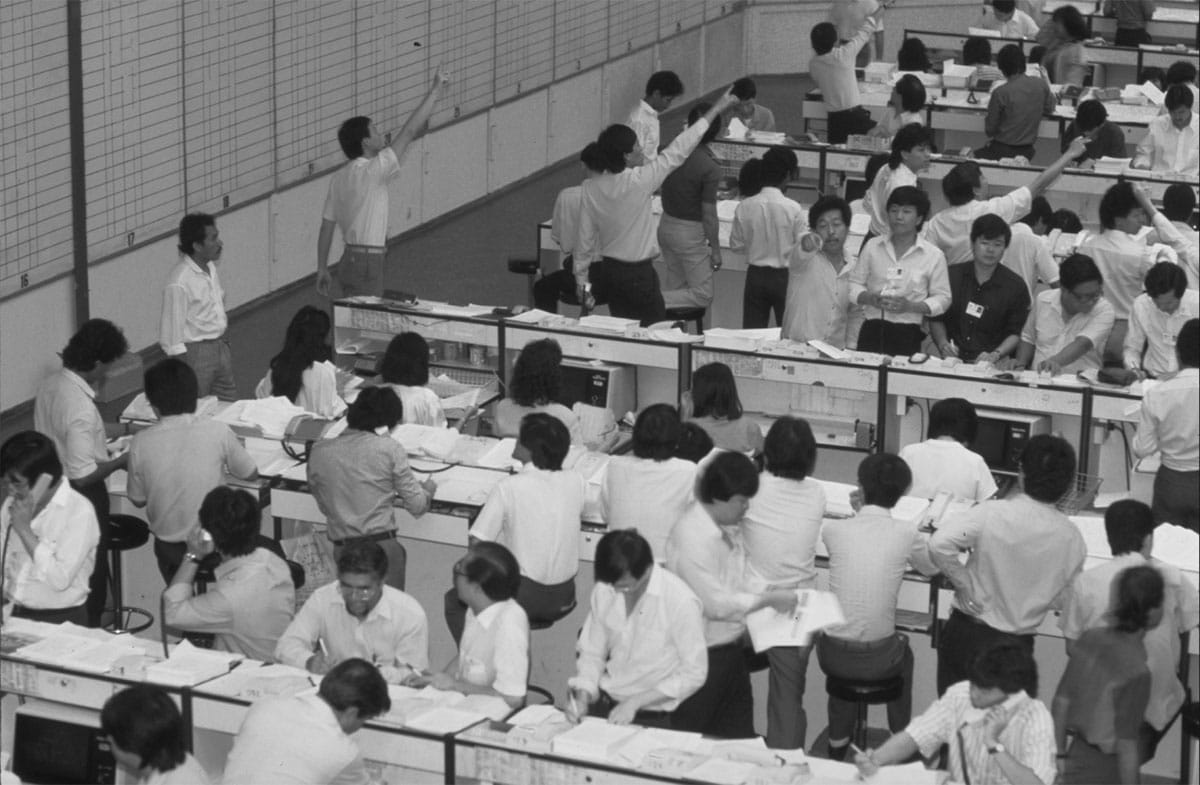
Remembering The Pan-Electric Crisis, Nearly 40 Years On
Why this incident marked a turning point in the evolution of our stock market.
Traders at the Singapore Stock Exchange in 1987. Ministry of Information and the Arts Collection, courtesy of National Archives of Singapore
BY WANDA TAN
As unlikely as it may seem given Singapore’s present-day reputation as a leading international financial hub, there was a time when the stock market was characterised by poor corporate governance. What changed everything was the 1985 collapse of Pan-Electric Industries Limited (Pan El), a marine salvage, hotel and property conglomerate that went into receivership after failing to settle debts of more than S$450 million.
Pan El’s demise caused chaos across the securities industry and prompted a three-day closure of the then-Stock Exchange of Singapore (SES), a forerunner of today’s Singapore Exchange (SGX). It marked the first and only time to date that the stock market was forced to shut down unexpectedly. Things would subsequently get worse before they got better as share prices tanked, investor confidence plummeted, and several stockbroking firms went bankrupt.
More importantly, the incident triggered a series of regulatory reforms that changed the way listed companies, shareholders and the SES itself behaved. Not only did these measures help the stock market recover, but they also introduced better regulation and oversight which continues to this day, underpinning our fair, orderly and transparent market.
A PRECARIOUS HOUSE OF CARDS
When Pan-El was declared insolvent and placed under receivership in late November 1985, the news shocked many. Pan-El had been considered a blue-chip company and its stock was held by some 5,500 shareholders, most of whom were small-time speculators looking to profit from the share price fluctuations. Practically overnight, these shares became worthless, and many small shareholders saw their savings wiped out.
Amid swirling anxiety about the stability of the stockbroking industry and the financial system in general, the SES management decided to close the stock market for three days from 2 to 4 December 1985. While unprecedented, it was viewed as a necessary step to contain the fallout, prevent panic selling, and buy time for policymakers to develop a rescue plan.
NEW ERA, NEW RULES
In the immediate aftermath of Pan-El’s collapse, the Big Four local banks set up a S$180 million lifeboat fund to bail out heavily-leveraged stockbroking firms, and forward trading was banned. Criminal investigations revealed fraudulent activities by Pan-El’s principal shareholder and several other persons, who were subsequently jailed.
The crisis also created the impetus to overhaul and tighten the securities regulatory framework, essentially ending SES self-regulation and placing the stock market under the supervision of the Monetary Authority of Singapore (MAS). A new Securities Industry Act was passed in 1986 that imposed various prudential regulations on SES member companies, such as minimum capital requirements, gearing limits, limits on exposures and investments, margin requirements, and maintenance of a reserve fund.
These and other regulatory changes helped the SES rebound quickly, and enabled Singapore to regain its status as a trusted financial hub — a reputation which remains intact today. SGX’s current disclosure-based regime, as enshrined in the Securities and Futures Act 2001, promotes adequate, accurate and timely corporate disclosures so that the investing public can make informed investment decisions.
Whereas Pan-El was a favourite among small shareholders in the past, retail investors today are speculating in “meme stocks” — stocks popularised on social media, such as GameStop — as well as digital assets like cryptocurrency. Both the meme stock mania and the crypto craze have attracted considerable attention, and trading in these securities is risky business. But having learned its lesson from the Pan-El saga, the stock market now operates like a well-oiled, well-regulated machine. In this environment, high corporate governance standards and market transparency assure investors that their interests are safeguarded.
Revisit the Pan El saga at a free public talk organised by the SAL Legal Heritage Advisory Committee. Speakers include leading stockbroking figure Mr Lim Hua Min, veteran journalist Mr Conrad Raj and Mr Tan Boon Gin from Singapore Exchange Regulation (SGX RegCo). Their discussion will be moderated by respected financial journalist Mr Tan Ooi Boon. Register here.

